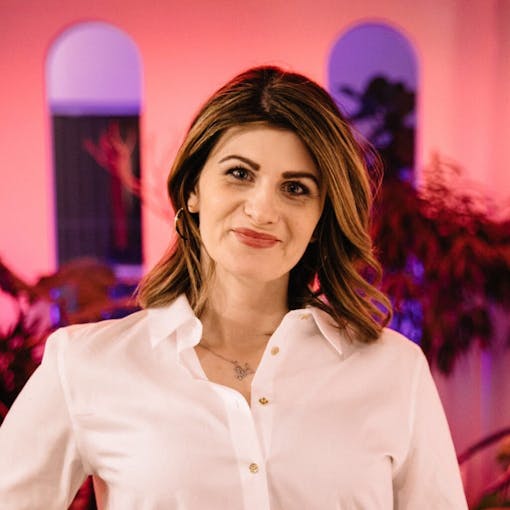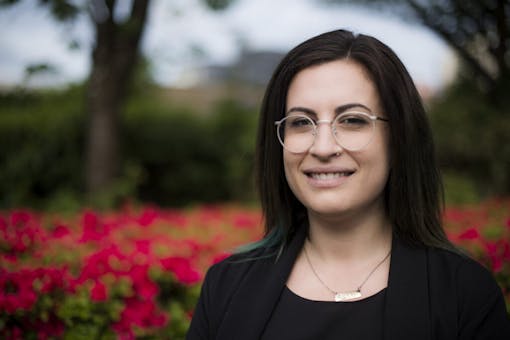Women hold some of the most innovative and impactful positions in the Canadian cannabis landscape. And breaking ‘grass’ ceilings and carving out space in a male-dominated industry is just the beginning.
These six women are united by their compassion for others and their willingness to go against the grain. They’ve persevered through countless policy changes, personal hardships, and other barriers in pursuit of the same goal: making cannabis more accessible.
While this is by no means a list of all the trailblazing women in weed, our highlights for Women’s History Month make the cannabis industry in Canada better every day.
Ashleigh Brown, Founder and CEO, SheCann; Consultant and Advocate

Follow on Twitter @AshleighSheCann and Instagram @SheCann
If there’s one thing SheCann founder and CEO Ashleigh Brown has exemplified, it’s that there’s power in community.
Since founding SheCann, an online community and advocacy group created for and by women who use medicinal cannabis, Brown puts a lot of pressure on herself to be there for each member in the community on a personal level.
“I can’t be anything but honest and open about this struggle. It is twofold: I am a disabled person working, raising a family, and advocating for myself and others. I want to be a good role model for my teenage daughters and other women,” she says.
“That means being vulnerable: it is hard, but at the same time, leading SheCann is arguably the most humbling gift I could ever experience,” says Brown. But it’s the grace of the community, she says, “that allows me to keep going, even on the hardest days.”
“Helping someone else, especially as you grieve and struggle in your own life—that is a gift beyond anything else.”
Ashleigh Brown, CEO and founder of SheCann
Brown says that the most rewarding part of leading the SheCann community has been witnessing people regain their quality of life.
“Then, they look around at the systemic issues like cost, taxation, and access, and ask me, ‘What can we do about this? How can we make this system better, not only for ourselves but also for our children, and loved ones? How can we be heard?’”
Shop highly rated dispensaries near you
Showing you dispensaries nearThat line of questioning has resulted in the newly launched Medical Cannabis Access Survey, created in partnership with McGill University, Medical Cannabis Canada, University of Manitoba, SheCann, and Santé Cannabis.
Ika Washington, Health and Social Policy Consultant, Diversity Talk

Follow on Twitter @IkaTheTweeter and Instagram @diversitytalk
The lack of diversity in the Canadian cannabis industry is undeniable. As the founder of DiversityTalk, Ika Washington is here to do exactly as the name of her consulting firm implies: talk about it.
“One of the biggest contributions that I’ve made is starting conversations—these difficult conversations about diversity, equity, inclusion, anti-discrimination, and anti-racism, and what these things actually mean to the cannabis industry,” she says.
Based on Washington’s experience, diversity “is not even a priority” for a lot of companies in cannabis. “But diversity can also impact your business negatively and positively.”
As a freelance consultant, Washington says the most difficult parts of the job are being heard by the people she’s trying to reach and creating partnerships with the right companies.
“Getting on the right platforms is so difficult; you really have to put yourself out there,” she says. “You always have to be proving yourself in this space, and it makes it extremely difficult to get work done.”
When approaching potential clients, Washington says she hears the phrase, “we’re diverse already” often. “Okay, that’s great,” she says. “But what kind of diversity? Who are they representing? What is the work culture like? Do they feel safe in those spaces? Are you addressing their needs? Are you listening?”
Working in diversity can be discouraging, she says, “but then I’ll get one person who messages me and says, ‘I need this,’ and I remember why I’m in this game.”
While progress is slow-moving and Washington sometimes feels invisible, “the beauty is, there are small changes happening and steps being made.”
Dr. Shelley Turner, Founder and Chief Medical Officer, Ekosi Health

Follow on Twitter and Instagram @EkosiHealth
“When we founded Ekosi Health back in 2019 our team spent a good deal of time thinking about why we exist, [and] what makes us unique,” says Dr. Shelley Turner, the founder and chief medical officer at Ekosi Health, a network of health centres focused on personalized cannabinoid therapies for patients.
“What we came up with is that our purpose is to build resilience, to help people help themselves. We focus all our efforts on putting the self-care back in healthcare and helping our patients to take their own health in their own hands.”
[Cannabis] does not feel like ‘work,’ but a purpose.
Dr. Shelly Turner, Ekosi Health
Since starting her practice, Dr. Turner has helped more than 17,000 Canadians access cannabis for medicinal purposes. Currently, she and the Ekosi team are working closely with members of Indigenous communities, several post-secondary institutions, industry stakeholders, and public sector organizations.
“While it is not a panacea, across the spectrum of pain, mood, and sleep health issues, we have seen how medical cannabis has improved the health of thousands of individuals over the years,” she says.
“On top of the effects of the medical cannabis itself, seeing individuals take responsibility and control over their own health outcomes is a very powerful thing.”
Kayla Mann, Chief Financial Officer, Habitat; Photographer

Follow on Twitter @mannipz and Instagram @kaylamannphoto
It’s no secret that operating a successful craft cannabis company can be a challenge in Canada. As the chief financial officer at B.C.-based Habitat, Kayla Mann knows firsthand how strict regulations and high taxation can affect a company’s bottom line.
While being a craft producer may come with challenges, Mann says all it takes is positive feedback from consumers to remind her why she does what she does.
“It’s the moment someone tells you that your product changed their life; that it smelled like Fruit Loops. Those are the ones that make me think, ‘Yeah, I can do this for another crop.’”
When she’s not managing finances, Mann is a professional nude photographer—a practice that helps her maintain creative balance.
“We live in a world that really glorifies financial knowledge, so I try to use my knowledge for a very specific type of financial work, work that has value,” Mann says. “Sitting in front of spreadsheets all day hurts my brain, so I need the balance. It’s so important to have both.”
Another thing that Mann says keeps her motivated is her company’s commitment to sustainability. Habitat uses an aquaponics system to grow cannabis and recycles 99.7% of all water used. It’s also working on implementing biofuel technology to further reduce waste.
Part of the appeal for Mann is in marrying the worlds of agriculture and cannabis, “and getting people to think about cannabis as a crop and an ingestible product just like anything else we put in our bodies to keep us healthy.”
Jenna Valleriani, Director of Social Impact & Advocacy, Canopy Growth Corporation

Follow on Twitter @jennav5 and Instagram @jennabobennaa
As the director of social impact and advocacy at Canopy Growth, Jenna Valleriani is responsible for leading the company’s strategic social purpose and community investment activities.
“I’m there to fund, drive, and collaborate on partnerships that support equity, justice, and positive community impact,” says Valleriani, who previously worked for non-profit organizations such as Canadians Students For Sensible Drug Policy (CSSDP) and the National Institute for Cannabis Health and Education (NICHE) Canada.
Valleriani says her work at Canopy goes far beyond identifying organizations or projects and cutting cheques; “it’s about undoing the harms of prohibition, and operationalizing that to prove that we’re putting our money where our mouth is.”
“The reality is, coming from the non-profit side, there are so many great ideas and so much work that needs to be done. The funding to get that work done is always so challenging,” she says. “So now to be on the other side, we’re able to fund really incredibly projects.”
There are currently several projects Valleriani is excited to see Canopy lend its support to. One is the next phase of a pop-up pardon clinic project by Cannabis Amnesty, which aims to help Canadians assess their eligibility for pardons.
Canopy is also supporting the Sentencing and Parole Project, which creates pre-sentencing reports for Black Canadians: “It’s really been a learning moment internally to talk about why we need to push the boundaries on what we fund, and why we shouldn’t just focus on cannabis pardons or [one initiative].”
Dr. Caroline MacCallum, Medical Director, Greenleaf Medical Clinic; Researcher

Follow on Twitter @camaccallum and Instagram @dr.carolinemaccallum
As a physician guiding patients through the process of using cannabis for medicine, Dr. Caroline MacCallum recognized that there wasn’t enough literature available to doctors looking for the appropriate information.
So she began writing it herself.
“I want my papers to be practical and provide helpful information regarding cannabis dosing, treatment, and safety—something that healthcare practitioners can print out and keep at their desk to be able to constantly refer to.”
MacCallum says other areas of burning interest include addictions, pediatrics, and topical cannabis products for use in geriatric patients “all are under-researched, vulnerable populations, where funding and grants have been very limited and [are] still very much needed.”
Dr. Caroline MacCallum, Greenleaf, researcher
MacCallum is also going above and beyond to help educate patients that want to learn more about medical cannabis. At Greenleaf, she recently launched an Ask The Expertseries with long-time cannabis cultivator Fonda Betts, giving patients the opportunity to learn about a range of different subjects.
“Patient education is invaluable in improving compliance, reducing adverse drug events or side effects, and maximizing benefits.”
MacCallum has high hopes for the future of Canada’s medical cannabis program. In her perfect world, the future of medical cannabis will include the integration of cannabis education into healthcare facilities including nursing, pharmacy, medicine, and psychology.








